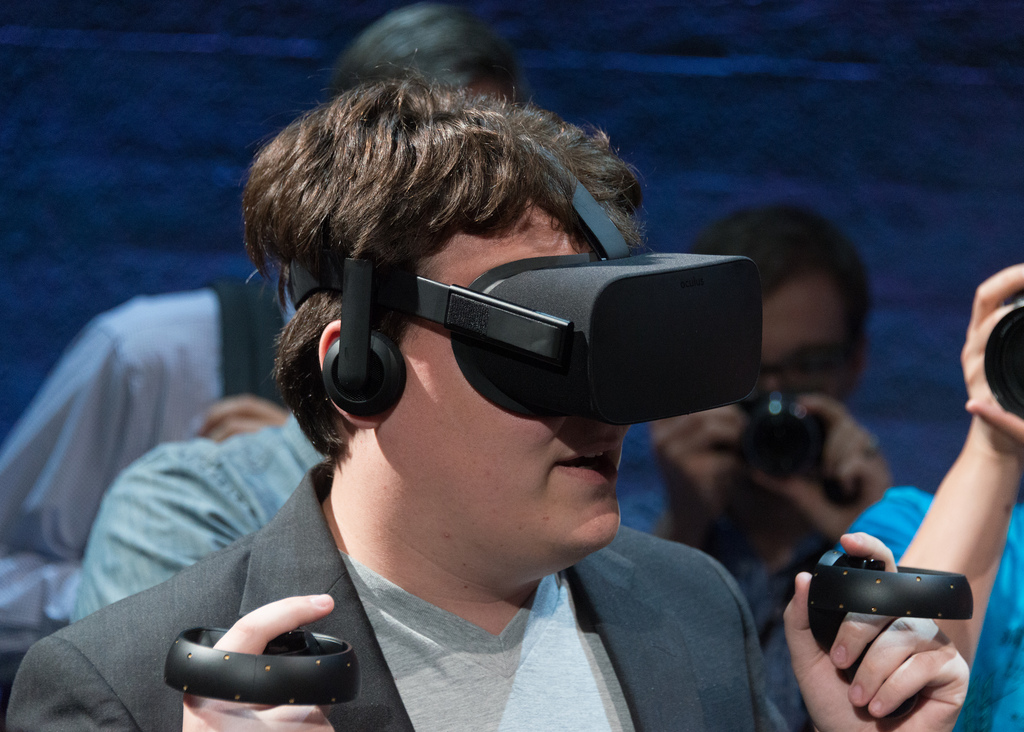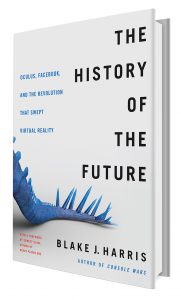interview
Down the Rabbit Hole of Political Intolerance in Silicon Valley
I took it as a good sign that by the time I got back to our family brunch all I could talk about was what I’d read about this kid (Palmer Luckey) and his incredible company (Oculus).

Editor’s note: Blake J. Harris is the bestselling author of Console Wars: Sega, Nintendo, and the Battle that Defined a Generation, which is currently being adapted for television by Legendary Entertainment, producers Seth Rogen and Evan Goldberg, and Scott Rudin. His second book, The History of The Future—which was published on February 19—chronicles the dramatic, larger-than-life true story behind the founding of Oculus, and its quest for virtual reality, and the company’s $3 billion acquisition by Facebook. What follows is an interview with Harris conducted by Quillette’s Clay Routledge.
Clay Routledge: I just finished your latest book, The History of the Future. And I have to tell you, I tore through it. Such a fascinating story in so many ways. What made you interested in telling the story of Oculus VR and its founder, Palmer Luckey?

Blake J. Harris: So back in 2014, my first book was published. This was a big, life-changing experience for me. Prior to that—for the previous eight years—I had been a commodities broker, buying and selling things like sugar, coffee and soybeans for Brazilian clients. But with the publication of Console Wars, I was able to quit that job and follow my dream (mostly I mean “writing”, but a little part of me also means “never wearing pants” #ShortsForLife). Anyway, as I was saying, Console Wars was life-changing for me; and one of the cool things that happened early on was that Popular Mechanics decided to write a feature about me. Needless to say, this was a VERY big deal in the Harris family. And so when the issue came out—on Mother’s Day 2014—I slipped away from our family brunch to go pick up a copy of the issue from a nearby bodega, feeling so excited; my big moment! Except instead of flipping through the magazine and checking out the piece about me, I was captivated by the person on the cover: a 21-year-old-kid wearing a virtual reality headset—and the story about his VR startup. I took it as a good sign that by the time I got back to our family brunch all I could talk about was what I’d read about this kid (Palmer Luckey) and his incredible company (Oculus).
From there, it took me nearly two years to get the access I would need to accurately and authentically tell this story, and then it took over three years to actually research and write the book (especially because—as I’m sure we’ll get to—the, uh, “unexpected twist”).

CR: I also really enjoyed your last book, Console Wars, which was about the Nintendo vs. Sega fight for video game dominance in the 90s. Both Console Wars and The History of the Future take place in the tech and gaming world. But to me, the more interesting theme that connects these books is what I view as stories of underdogs who found improbable success. Do you agree or have any thoughts on that observation?
BH: For me, for any writing I do, the ideal reader that I think about when I write is my grandmother. Because basically what I want to challenge myself to do is to tell these tech/gaming stories in an ultra-accessible way so that someone without knowledge of these topics (Sega, Nintendo, Virtual Reality, etc.) could still enjoy them. And the key to that, I think, is by focusing on the characters, their ideas, and universal themes—to lay out Console Wars as a story about a father-of-three vacationing in Hawaii who gets approached with a surprising job offer; and to set up The History of the Future as a modern day “American Dream” story about an inventor who wants to start a company to sell his thing.
I suppose all of that is a long-winded way of saying: you’re totally right! I don’t think that with either I ever thought to myself “I need to find a good underdog story” but your observation is a good one in that an underdog tale sort of inherently solves my writing-for-grandma-problem. And I think the other thing—the reason I’m particularly drawn to underdog stories—is because each of these books took me 3-4 years to write; that’s a lot of time spent with these characters and these companies, and (on a personal level) I think the uplifting and inspirational nature of these types of stories is partly necessary to keep me energized for these long hauls in storytelling.
CR: In the span of a few years, Oculus went from something teenage Palmer Luckey was working on in a trailer in his parents’ driveway to a company that was purchased for billions of dollars by Facebook. The book has a lot of amazing details, including emails and other documents, regarding discussions and decisions within Oculus and with other tech companies, even Facebook. How did you gain so much access?
BH: As I mentioned above, access for me is critical. I want readers to feel like they’re in the room with these people—in their minds, oftentimes—and the only way to properly do that is with a lot of access to those that I’m writing about.
This book was based on hundreds of interviews and reviewing over 25,000 internal documents and—to your point—I frequently included actual archival emails, so I thought it might be fitting to do so here. In particular, this is an email that I’ve never before shared from August 2014: Palmer’s initial response to my seeking access for a book about Oculus.
From: Palmer Luckey
To: Blake Harris
Date: August 17, 2014
Sorry for not getting back to you till now, lots of people reaching out on your behalf, so you must be serious. 🙂
Great job on Console Wars, it was a compelling read.Several other fans at Oculus.
As you can probably imagine, there have been a lot of people interested in writing about Oculus, but so far, we have turned everyone down.Same thing goes for documentary requests – time will tell if Oculus is really worth writing about, we have a long road ahead.Going from a trendy niche game dev toy to mass market consumer product is going to be tough, the gut feeling of most people on the team is that working closely with someone on a book/movie/etc would seem arrogant this early on.What are your thoughts?
Best,
Palmer
Having never spoken with Palmer before, I was a bit struck by how mature his reasoning seemed to be.
CR: Much of the book is about how Oculus came to be as well as how they energized a broader virtual reality movement. It is very inspirational. However, the latter part of the book takes a darker turn in which a series of events ultimately lead to the founder of Oculus, Palmer Luckey, getting fired by Facebook. Can you describe what happened?
BH: So I should begin by saying that Palmer has been a long-time supporter of Donald Trump’s political aspirations. Not just in 2016, but way back in March 2011, he posted the following on his Facebook page: “So, Donald Trump says he is seriously considering running for president in 2012, since he does not think anyone else can save America. He says he will make his final decision by June. I am thinking this might be pretty awesome.”
I’ll note here—for those who care about such things—that I’m a lifelong liberal (I actually grew up in the town where the Clintons now live) and, unsurprisingly, I’m no fan of Donald Trump. But even so, I strongly believe that EVERYONE should have the right to support whichever candidate they chose; and, well, let’s just say that was not the case at Facebook.
To answer your question, here’s a quick recap of what happened: in September 2016, Palmer donated about $10k to a pro-Trump organization called Nimble America whose mission was to “Develop and advocate for legislation, regulations, and government programs to promote America first, improve legal immigration, fight corruption and stimulate the economy” and, to accomplish this mission, planned to put up snappy, meme-like billboards in swing states.
On September 13, Nimble America filed the paperwork to officially become a 501(c)(4) organization (which was a designation for nonprofits dedicated to “promoting social welfare.”). Nine days later—on September 22—The Daily Beast published an article with the following headline: “The Facebook Billionaire Secretly Funding Trump’s Meme Machine: Palmer Luckey—founder of Oculus—is funding a Trump group that circulates dirty memes about Hillary Clinton.”
Fifteen minutes after The Daily Beast article went live, a prominent tech blogger named Anil Dash who—according to his website—has been cited in “hundreds of academic papers” and “sources ranging from the New York Times to the BBC” posted the following two tweets to his 590,000 followers on Twitter:
This guy, @PalmerLuckey, put some of his billion FB dollars toward explicitly funding white supremacy. Peter Thiel approved the acquisition. pic.twitter.com/4Qa6T0w5mI
— anildash.com (@anildash) September 23, 2016
Obviously—to anyone who did a cursory investigation into Nimble America—this was not true. But it made for a juicy story that sounded maybe-sorta-kinda-true and, over the course of the next 24 hours, hundreds of articles like these: “How Your Oculus Rift is Secretly Funding Donald Trump’s Racist Meme Wars” (Ars Technica) “What Does Alt-Right Patron Palmer Luckey Believe?” (Motherboard) and “Palmer Luckey is the Worst, But He Doesn’t Reflect Silicon Valley” (WIRED).
Naturally, in this face of this insanity, Palmer Luckey drafted a public statement to clarify what was true, what was false, and who he planned to vote for in 2016. But unfortunately, this statement (particularly any mention of supporting Trump) was deemed unacceptable by Facebook. So much so that Mark Zuckerberg himself ended up drafting a statement that Luckey would need to publish if he wanted to keep his job—a statement that professed Luckey would be voting for…Gary Johnson.
CR: What appeared to have happened to Palmer Luckey is a story we are seeing more and more. A person has some unpopular views or political affiliations and he or she is smeared, ostracized, and often fired. People complain about the lack of tolerance and viewpoint diversity in academia, but I am also increasingly hearing such complaints about the tech world. When working on the book, did you get a sense that these are growing problems in tech or other types of companies?
BH: Absolutely. As I said above, I spent several years on this book, and that’s largely because the final two were spent going down this rabbit hole of political intolerance in Silicon Valley. The deeper I delved into this topic and the more people I spoke with, it became very clear to me that what happened with Palmer—from the inaccurate reporting, to the online mob, to the professional discrimination—was not an isolated instance; in fact, part of the reason I focused so heavily on this was because his situation seemed to so perfectly personify Life Circa 2016. And the other reason I focused so heavily on this was because Facebook is one of the most powerful companies in the world—a company built on an ethos of “openness” and transparency”; who literally hangs up posters on campus with the slogans “Always Assume Positive Intent” and “Bring Your Authentic Self to Work”—and, well, given that Facebook has ambitions of owning virtual reality, I think their actions in actual reality are incredibly important to assess and evaluate.

To this point, I’ll end with a passage from Chapter 45 in the book…
After the election, the majority of Facebook employees appeared to feel some combination of shocked, devastated, and/or horrified. This cocktail of emotions seemed to crystalize in the creation of a quickly popular internal Facebook group called “Refocusing Our Mission.” As per the page’s introductory message—“The results of the 2016 Election show that Facebook has failed in its mission”—the conceit of this group was that Trump’s victory was some sort of proof that Facebook needed to change its ways.
Although it’s natural to empathize with the frustration that those joining this group must have felt, a handful of Facebook employees— people from both sides of the political spectrum—felt that something was very unnatural, creepy even, about seeing the election results as proof that Facebook had somehow failed. Because, frankly, it provided a pretty ugly answer to the question people continued to ask more and more: What is Facebook? Well, according to the founder of “Refocusing Our Mission” and the hundreds of employees who quickly joined and engaged, Facebook was basically some sort of social engineering tool—an invisible hand meant to guide its users toward the “correct” political beliefs.
Or to put it another way: since Zuckerberg often described Face- book as “like a utility,” then this reaction was the equivalent of AT&T declaring that Mondale losing to Reagan meant it was time for them to rethink the mission of this whole phone line network thing.






